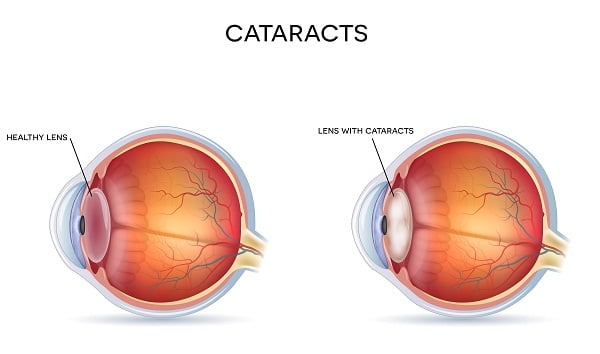What Is a Cataract?
- Updated on: Jun 5, 2024
- 4 min Read
- Published on Oct 3, 2019


Overview of cataract
Human eye is precious! Without them no one is able to see this beautiful world. Our eyes have natural lens which is the clear part of the eye. The lens helps in focusing light coming from an object or from outside into the retina of the eye.
The retina is a light sensitive tissue which is present at the back of the eye which helps in transmitting the focused light to the brain through optic nerve by converting it into electrical signal for image interpretation.
The lens should be clean in order to pass light and focus them on retina properly. But when we age, the protein which builds up in the eye, forms clumps and cloudy spots on the lens and makes our eyes translucent or opaque. Therefore, light does not pass clearly through the lens thereby interrupting in focusing the light clearly on the retina. This results in blurred, cloudy or hazy vision. This condition is called cataract. Cataract patients see the objects as they are seeing them through frosty window.
Mostly cataracts are related to age and develop slowly as we grow older. Cataract is very common in older people who are of the age 60 and above. It can also occur in people between the age of 40 and above. As the progression is gradual, people do not notice it till it interferes with the vision.
Although cataracts do not cause any irritation, itching in the eye or deterioration of lens but the cloudy spots progress all over the lens area and cause vision loss or causes cloudy vision which interferes with the daily routine activities of a person. This can make him difficult to drive, recognize faces and see anything clearly.
Half of the Americans have cataract or have already gone through cataract surgery in one or both eyes by the age of 80. It is the most common age-related eye disease all over the world.
Is cataract contagious?
Cataract can occur in one or both eyes. It is more likely that if one eye has cataract then the other one is also affected because cataract spread from one eye to other. But it is not a contagious disease and cannot spread from one person to another.
Who can develop cataract?
Anyone with an old age of 40 and above can develop cataract. Other risk factors of cataract that may increase the chances of developing it in a person are:
- Eye injury
- Diabetes
- Corticosteroids medications for long term
- Prior eye surgery
- Exposure to sunlight for long time
- Obesity
- Smoking
- High blood pressure
- Excessive alcohol intake
What are the different types of cataract?
Cataract can be of several types depending on the degree of clouding within the lens and based on the region on the lens where clouding occurs. The various cataract types are:
- Nuclear cataracts
- Cortical cataracts
- Posterior sub capsular cataracts
- Congenital cataracts
Besides ageing people can also develop cataract due to other health conditions such as eye injury, prior history of eye operation, diabetes and prolonged use of steroid medications. Various types of cataract that are caused by conditions other than ageing are listed below:
- Secondary cataract
- Traumatic cataract
- Congenital cataract
- Radiation cataract
What are the signs and symptoms of cataract?
The symptoms of cataract usually get unnoticed till the cloudy formation affects your vision and makes your vision blurred. As it progresses slowly, you can experience some of the below symptoms which indicate cataract progression:
- Double vision
- Problem with glare during day time
- Shortsightedness
- Blurry vision or cloudy patches
- Colors do not appear bright as usual
Other than the above listed symptoms you can get some other symptoms too depending upon the type of cataract you have and the progression of the disease.
How is cataract diagnosed?
If any symptoms occur, proper diagnosis of the eye is necessary to check whether you have cataract or any other eye disorder and also to know what type of cataract you have and to what extent it has been progressed. The diagnosis of cataract is done by the following comprehensive eye tests:
- Visual acuity test
- Tonometry
- Dilated eye examination
Eye examination and treatment of cataract
Eye examination provides the information necessary to diagnose and treat the cataract. Usually cataract is treated with surgery. Various treatment options available for cataract are:
- Prescribed glasses or contact lenses
- Surgery
If vision problem is not solved by the glasses and lenses then only option left to treat the cataract is surgery in which natural lens of your eye is replaced with artificial lens implanted in eye surgically.
Surgery for cataract
Surgery is an effective way to treat severe cataract and also avoid vision loss. Age related cataract is a major cause of vision loss or blindness in the world because of lack of facilities for surgery in some nations.
Can you recover vision after treatment of cataract?
Although vision is recovered immediately after surgery, you should need to follow certain prevention measures and care instructions given by your doctor. These may include avoiding vigorous activities and household chore.
You will require care till you have recovered fully and get glasses to correct intraocular lenses implanted through surgery. These care processes protect your eyes from getting post-surgical complications like continuous itching in eyes, uncontrolled fluid discharge from eye and in some cases retinal detachment.
The recovery after surgery will take up to 8 weeks and for some days itching and discomfort in eyes are common but if it persist for long time even after taking care and using eye drops given by your doctor, you should consult the doctor to know the exact cause of the problem.












